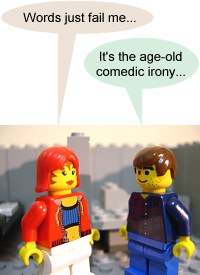

| Archive Blog Cast Forum RSS Books! Poll Results About Search Fan Art Podcast More Stuff Random |
|
Classic comic reruns every day
|
1 Ophelia: Well, Loren's gone, Will. Are you okay?
1 Shakespeare: It's for the best.
2 Shakespeare: <sigh> How am I ever going to find an intelligent woman who appreciates creative writing and genre fiction?
3 {Will walks off}
4 Ophelia: Words just fail me...
4 Mercutio: It's the age-old comedic irony...
|
First (1) | Previous (1348) | Next (1350) || Latest Rerun (2862) |
Latest New (5380) First 5 | Previous 5 | Next 5 | Latest 5 Shakespeare theme: First | Previous | Next | Latest || First 5 | Previous 5 | Next 5 | Latest 5 This strip's permanent URL: http://www.irregularwebcomic.net/1349.html
Annotations off: turn on
Annotations on: turn off
|
Right now your reaction is either:

If the above has merely served to confuse you, allow me to elaborate. Irony is traditionally defined as a literary device in which a writer, author, or speaker states something, but where the literal meaning of the statement is the opposite to how the passage should be understood or interpreted by an audience in its correct context.
For example, consider a scene from that fine literary classic, Star Wars: Episode II - Attack of the Clones. In it, Palpatine says to Anakin Skywalker, "I see you becoming the greatest of all the Jedi, Anakin." But we, the audience, know what Anakin's fate is to be. This is irony.
Example the second: In the wonderfully improved Special Edition version of Star Wars: Episode IV - A New Hope, there is a scene in which Han Solo encounters Jabba the Hutt and gains an extension on his repayment time for his outstanding debt. Han thanks Jabba for his generosity with, "Jabba, you're a wonderful human being." Jabba interprets this as a compliment, whereas we, the audience, read between the lines and know that Han meant something completely different. Also irony.
Some scholars of English insist that other situations, which are nowadays commonly described as ironic, but which don't fall into this classical definition, are not irony at all, but merely poor usage of English by people who don't understand what irony really is.
For example, consider a line from Alanis Morrisete's 1995 hit song Ironic:
A traffic jam when you're already lateMany people would call that an ironic situation. Hey, you're running late, and you get stuck in a traffic jam that just makes you later. Irony, right? Well, not according to the traditional definition of irony. It's an annoying coincidence, but not irony.
Well now, here we get to the gist of the situation. If most people call it irony, and understand what you mean when you call it irony, isn't that good enough? Is English based on how words were defined and used hundreds of years ago, or how most people use the words now?
I think it's a mixture of both. English clearly changes over time; the meanings of words evolve as people adapt them to new uses. You can't fight it and expect to win. Society will wash over you like the tide over King Canute. But you also need agreed meanings of most of the words in the language in order to form a basis for that variation; you need words with accepted definitions inherited from the past.
Is "irony" one of the words we should all agree on as having the definition it had centuries ago, or is it one of the words that has been adapted to modern situations and usage, so that it has effectively absorbed a new meaning? My feeling is that if some people keep getting annoyed because everyone around them keeps using a word in the "wrong" way, then they've already lost the battle. I'm not saying if that's a good or a bad thing, just that continuing to get annoyed over it is a waste of time, because the only thing that's going to happen is that it'll become more and more common.
Rather than get more curmudgeonly as I get older, I get more relaxed about things like this that used to annoy me. My pet peeve for a long time was "organic" used to describe food produced without "chemicals" (there's another good one). All food is organic! I used to cry, It's made of carbon compounds! But you know what? When people describe food as "organic", they know what they mean and, despite any indications to the contrary, I know what they mean. So what's the problem here? So I decided not to worry about it any more.
And you know what? I'm a lot happier and more relaxed. Ironic, huh?
|
LEGO® is a registered trademark of the LEGO Group of companies,
which does not sponsor, authorise, or endorse this site. This material is presented in accordance with the LEGO® Fair Play Guidelines. |